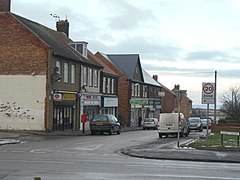Lynemouth
 From Wikipedia - Reading time: 7 min
From Wikipedia - Reading time: 7 min
| Lynemouth | |
|---|---|
 Market Square, Lynemouth | |
Location within Northumberland | |
| Population | 1,858 (2011 census)[1] |
| OS grid reference | NZ295915 |
| Civil parish |
|
| Shire county | |
| Region | |
| Country | England |
| Sovereign state | United Kingdom |
| Post town | MORPETH |
| Postcode district | NE61 |
| Police | Northumbria |
| Fire | Northumberland |
| Ambulance | North East |
| UK Parliament | |
Lynemouth is a village in Northumberland, England, 3 miles (5 km) northeast of Ashington, close to the village of Ellington to the north west. It was built close to coal mines, including Lynemouth Colliery.
Lynemouth and the surrounding industrial area featured in the 1985 docudrama Seacoal about the seacoalers who made a living from collecting waste coal from the beach. A series of photographs in the Henri Cartier-Bresson Award–winning[3] book In Flagrante (1988) by Chris Killip shows the work and life of the seacoalers;[4] more were published in 2011 in the book Seacoal.[n 1]
To the south of the village is the former Alcan Lynemouth Aluminium Smelter, now closed, and Lynemouth Power Station.
Governance
[edit]Lynemouth electoral ward stretches north along the coast to Craster, with a population at the 2011 Census of 4,842.[5]
Freedom of the Parish
[edit]The following people and military units have received the Freedom of the Parish of Lynemouth.
Individuals
[edit]- Gillian Thompson: 4 May 2016.
- Sarah Hannah "Sadie" Williamson: 4 May 2016.[6]
- Milburn Irving Douglas: 10 May 2017. (Awarded Posthumously)[7]
In popular culture
[edit]The village can be seen in the 2000 film Billy Elliot. Lynemouth Cemetery doubles as Everington Cemetery, in which Elliot's mother is buried.[8] The colliery, demolished in 2005, can be seen in scenes filmed at the cemetery.
Notes
[edit]- ^ Chris Killip, Seacoal (Göttingen: Steidl, 2011; ISBN 3-86930-256-9).
References
[edit]- ^ "Parish population 2011". Retrieved 29 June 2015.
- ^ "Lynemouth Parish Council". Lynemouth Parish Council. Retrieved 13 July 2021.
- ^ "Chris Killip: Skinningrove: A film by Michael Almereyda", New York Review of Books, 22 July 2014. Accessed 27 November 2014.
- ^ Gerry Badger, Chris Killip (London: Phaidon, 2001; ISBN 0-7148-4028-9), pp. 72–89.
- ^ "Ward population 2011". Retrieved 29 June 2015.
- ^ "Freedom accolades for Gillian and Sadie". Morpeth Herald. 19 June 2016. Retrieved 13 July 2021.
- ^ "Honorary Freemen". Lynemouth Parish Council. Retrieved 13 July 2021.
- ^ "Dying for someone to take care of cemetery; Plea for landowners to clean up overgrown graveyard" - Evening Chronicle, 22 July 2008
External links
[edit]- Northumberland Communities (accessed: 10 November 2008)
 KSF
KSF